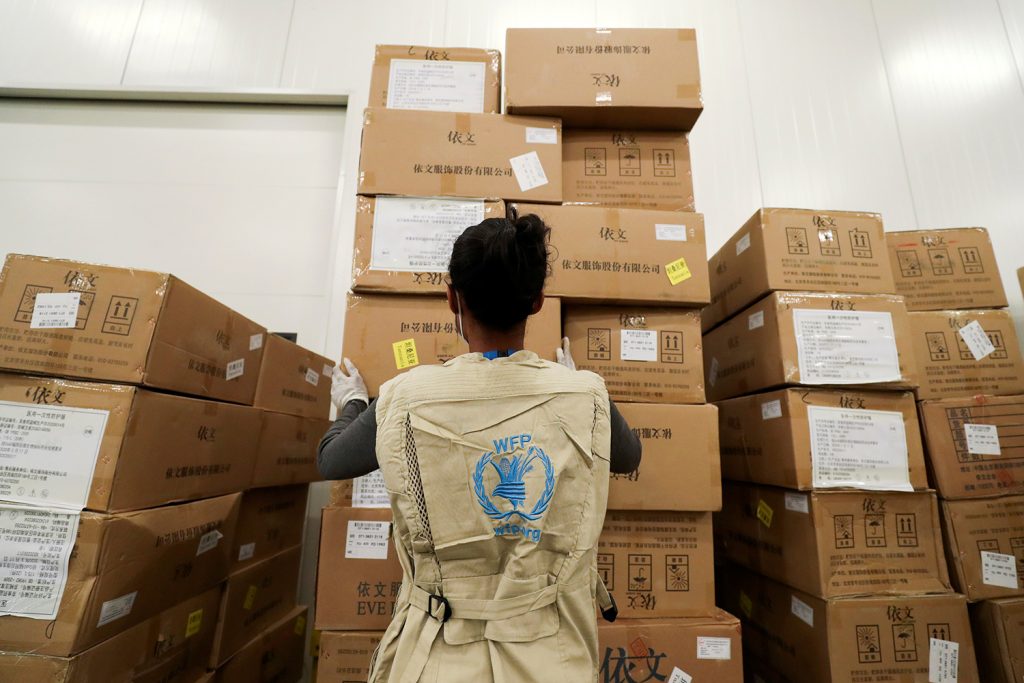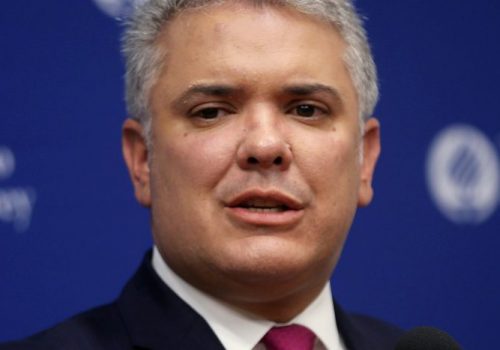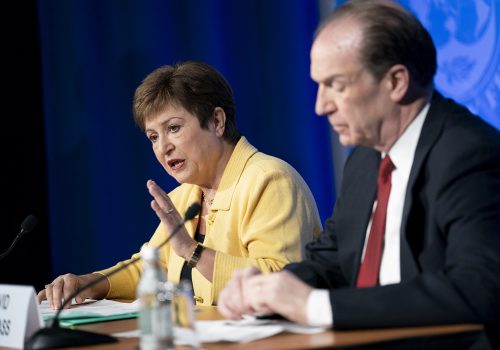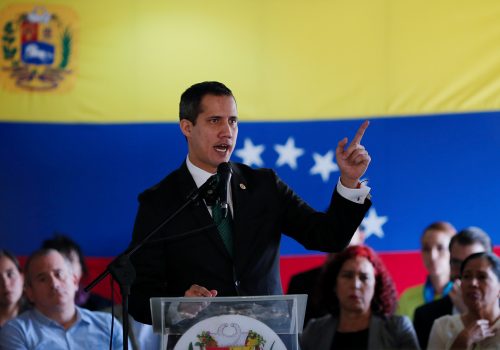Up to 300,000 people could starve to death every day if the COVID-19 pandemic ruptures global food supply chains—even more than the roughly 275,000 people who have died of the disease worldwide so far.
That’s just one of several dire warnings issued by David Beasley, executive director of the United Nations World Food Programme (WFP).
Beasley spoke on May 8 with Cameron Hudson, a nonresident senior fellow with the Atlantic Council’s Africa Center, and Damon Wilson, the Council’s executive vice-president during an Atlantic Council Front Page event.
The online chat happened to fall exactly seventy-five years after V-E Day, the 1945 Allied victory over Nazi Germany. Referencing the anniversary, Beasley warned that 2020 could be remembered as the deadliest year for humanity since World War II.
“That was a tough time, but the supply chains didn’t break down—except in war zones,” he said. “Right now, you’ve got supply chains breaking down all over the world.”
Beasley, sixty-three, served as governor of South Carolina from 1995 to 1999. He was nominated to head the WFP in February 2017 by Nikki Haley, the then US ambassador to the UN and a fellow former governor of South Carolina.
“Back in December, January, and February—before COVID-19 was on the global scene—I had already been telling leaders around the world that 2020 would be the worst humanitarian crisis since World War II, especially in Yemen, Syria, Lebanon, Sudan, the DRC [Democratic Republic of Congo], Ethiopia, and Somalia,” he said. “Then desert locusts began to hit, and now we’re looking at the second wave, which is going to be twenty times bigger.”
He added: “If farmers can’t get food to the marketplace, it impacts the rest of the population. And if farmers aren’t out there planting, then next fall when it’s harvest time, there’ll be serious food shortages. In Sudan, for example, there’s flooding. And desert locusts are consuming a million acres of just-planted crops. You’ve got a perfect storm of extraordinary proportions coming together right now.”
According to Beasley, 821 million people go to bed at night chronically hungry; another 135 million are acutely food-insecure. But as COVID-19 wrecks the global food supply chain, that number could more than double to 265 million—roughly the population of Indonesia.
“Acute means you’re on the brink of starvation,” he said. “On any given day, we feed about 100 million people, of which 30 million get their only food from us. You can go a few weeks exposed to a disease, but you can’t go two weeks without food.”
If economic deterioration continues and supply chains break down, he said, “you could have 150,000 to 300,000 people die of starvation every day for several months—at a minimum.”
On April 21, Beasley told a virtual session of the UN Security Council that “we could be facing multiple famines of biblical proportions within a short few months” if the world body doesn’t act quickly to secure access, avoid funding shortfalls and disruptions to trade.
In a worst-case scenario, he said, famine could ravage about three dozen countries. And one million people in each of ten countries are already on the verge of starvation: Afghanistan, DRC, Ethiopia, Haiti, Nigeria, South Sudan, Sudan, Syria, Venezuela, and Yemen.
The crisis is compounded by tanking crude oil prices, given that two of those countries—South Sudan and Venezuela—derive 98 percent of their revenue from petroleum exports.
“We’ve got to get these economies rolling. Otherwise, more people are going to die from the cure than from the disease,” he warned. “We’ve got the expertise, because we deal in war zones. When most organizations are leaving at a time like this, this is when we come in strong and hard.”
Beasley said 97 percent of WFP employees are currently in the field, supplying food to those who need it but also transporting millions of coronavirus test kits, masks, gloves, gowns, and ventilators to wherever they’re needed. Beasley said his agency is also building hospitals in Abu Dhabi as well as in Accra, Ghana, and in Addis Ababa, Ethiopia.
“We don’t deliver just food. We are the humanitarian logistics coordinator for the entire United Nations,” said Beasley, estimating that the WFP will need $965 million over the next six months just to address logistical issues. “We’re the biggest airline industry operating right now. If we weren’t already where we are, we’d have famine in many countries.”
Beasley said that in 2019, the United States contributed $3.4 billion to WFP, about 40 percent of its total funding.
Contributions to WFP so far in 2020 total $1.62 billion; the top five donor countries are the United States ($415.8 million); Germany ($265.2 million); Sweden ($148.8 million); United Kingdom ($136.1 million) and Canada ($107.4 million).
“But if the US, which has the most sophisticated supply chain on Earth, is running out of toilet paper, what do you think is happening in Niger, Chad, Ethiopia, or Yemen? Many of the people we’re talking about don’t have coping capacity,” he said. “These people are barely making it now.”
The situation is especially precarious in urban areas like Nairobi or Lagos.
“If you’re going to do a lockdown where people don’t have any coping capacity, we’ve got to come in advance and pre-position food so they can live,” he said. “Otherwise you’re going to have riots and destabilization—and that’s the last thing we need right now.”
Larry Luxner is a Tel Aviv-based freelance journalist and photographer who covers the Middle East, Eurasia, Africa and Latin America. Follow him on Twitter @LLuxner.
Further reading:
Image: A World Food Program (WFP) worker arranges relief packages at a warehouse designated to the United Nations for humanitarian aid for Africa to combat the outbreak of the coronavirus disease (COVID-19), at the Bole International Airport in Addis Ababa, Ethiopia April 14, 2020. REUTERS/Tiksa Negeri



